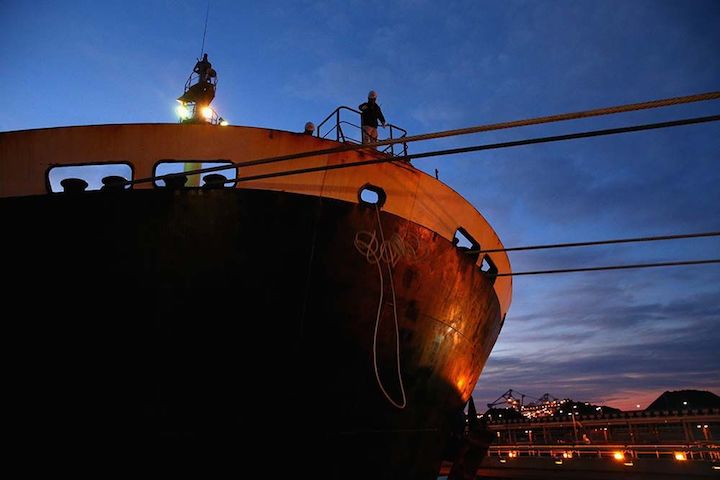China blacklist strands more than 50 Australia coal cargoes
More than $500 million worth of Australian coal is on ships anchored off Chinese ports, as a diplomatic spat between the two countries cuts into trade, idles a portion of the world’s dry bulk carriers and threatens to spiral into a humanitarian crisis.
More than 50 vessels have been waiting a month or longer to offload coal from Australia, according to separate analyses of shipping data conducted by Bloomberg and data intelligence firm Kpler. There are about 5.7 million tons of coal on the anchored ships, which are mostly Capesize and Panamax-sized vessels, according to Kpler, and an estimated 1,000 seafarers.

The cargo and crew are victims of China’s move to blacklist a wide swathe of Australian commodities and foodstuffs, ratcheting up tensions between the two trading partners that have deteriorated since Huawei Technologies Co. was barred from building Australia’s 5G network in 2018. Chinese power stations and steel mills were told to stop using Australian coal and ports were instructed not to offload the fuel, Bloomberg News reported in October.
“Aussie coal producers might be looking at other destinations for coal, such as Japan or India, but given the quantum of impact, they will likely trim down production as well,” said Abhinav Gupta, a research analyst at Braemar ACM Shipbroking. “More importantly, this is leading to seafarers being stuck on ships outside of their contractual obligation, a situation that was started by the pandemic.”
A total of 66 vessels loaded with Australian coal are positioned in Chinese waters, according to shipping data analyzed by Bloomberg, most of them off the northeast coast near the ports of Jingtang and Caofeidian.
Meanwhile, Kpler identified 53 vessels holding Australian coal waiting about four weeks or longer to discharge at Chinese ports. Thirty-nine of the ships are carrying about 4.1 million tons of metallurgical coal, while nine are carrying about 1.1 million tons of thermal coal, Kpler analysis showed. Another five vessels were carrying types of coal that weren’t identified.
Australian coking coal traded at about $101.57 a ton in Singapore on Monday, while thermal coal traded at about $63.40 on ICE Futures Europe. Assuming that the unidentified cargoes were the cheaper of the two types, the value of coal on the vessels identified by Kpler is approximately $519 million.
Ships carrying coal from all exporters generally waited three to five days for a berth prior to China’s restrictions on Australian shipments, according to Kpler.
The flotilla of vessels waiting to offload is also tightening the fleet supply in the region, according to Braemar ACM Shipbroking’s Gupta. There were 133 dry bulk vessels waiting to discharge at Chinese ports in mid-November, 59 of which had been waiting for 20 days or more, BIMCO said in a Nov. 24 report citing ship-tracking data from VesselsValue.
Chinese officials have blamed Australia’s “Cold-War mentality” for worsening relations with Canberra, adding its trade actions are consistent with World Trade Organization rules. The country’s foreign ministry earlier this month acknowledged the plight of one vessel saying authorities had not restricted the ship from leaving and the situation was down to the freight-forwarder’s commercial interests.
The ban on Australian coal has happened in tandem with a broader push to restrict imports of the fuel, a common tactic Beijing uses to prop up domestic coal prices and support local mining companies.
But authorities may grant additional import quotas as peak winter demand draws near, and after the benchmark Qinhuangdao port price rebounded above the intervention level of 600 yuan a ton. Selected ports could get about 10 million tons of extra quotas through the end of the year, Morgan Stanley said in a note Monday.
Similar Stories

Drewry Intra-Asia Container Index - 15 Jan
View ArticleUnited States and Norway issue innovative report creating greater transparency in critical mineral supply chains
Today, the U.S. Department of Commerce and the Norwegian Ministry of Trade, Industry, and Fisheries issued a thorough, innovative report presenting our shared understanding of non-market policies and practices (NMPPs)…
View Article
New helicopter operations guide launched by International Chamber of Shipping
View Article
KR grants world’s first AIP to HD KSOE for pioneering large-scale liquid hydrogen tank vacuum system
View Article
DNV launches class notations to provide framework for safe development of autonomous shipping technologies
View Article
Discover IAX1, CMA CGM’s new feedering service linking Türkiye and Bulgaria
View ArticleGet the most up-to-date trending news!
SubscribeIndustry updates and weekly newsletter direct to your inbox!





